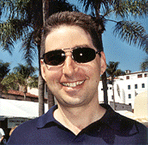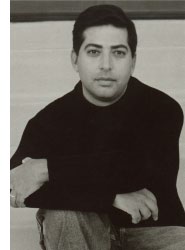Author2Author: The Goldberg Brothers
Here’s an Author2Author twist: brothers! Lee Goldberg and Tod Goldberg are actually appearing together tonight at the Santa Monica Barnes & Noble, and to celebrate I’m finally getting it together to run the battery of questions and answers they sent me, oh, months ago. (Really, I am finally getting the hang of writing two blogs, honest I am…)
 Lee: You broke into publishing by writing short stories (which have been collected in your new book Simplify), but would you recommend other writers take the same route? From everything I’ve heard, the short story market is supposedly dead…unless you can live by eating the free issues the literary journals offer witers as payment. (Anyone have a good recipe for Journals Au Gratin?)
Lee: You broke into publishing by writing short stories (which have been collected in your new book Simplify), but would you recommend other writers take the same route? From everything I’ve heard, the short story market is supposedly dead…unless you can live by eating the free issues the literary journals offer witers as payment. (Anyone have a good recipe for Journals Au Gratin?)
Tod: Everyone has their own route, of course, but for me writing short stories before attempting to write my first novel just sort of made sense in an artistic way and in a self aggrandizing way. When I really began to take writing seriously, which is to say after I got out of college and was able to recognize how exceptionally awful the novel I thought I was writing in my last creative writing course at Harvard (and by Harvard, I mean: Cal State Northridge) was—the premise had something to do with a semi-haunted house in Maine, a state I’d never visited, that a (surprise!) college graduate student had volunteered to watch over summer; I never got past page 65, due in no small part to my Kaypro crapping out and the fact that, well, it sucked—short fiction seemed to be the best way for me to hone my skills. It also gave me a strong sense of completion in a fairly short amount of time, which made me feel good.The short story market is far from dead. There are literally thousands of print journals and magazines and many more online as well, and I’d venture to say that all of the folks getting published by them are likely not of the Zombie-variety. You can’t make money, at least not at first, but what you can make is something far more important: a reputation and a publishing history, both of which are quantifiable things in the publishing business. I happen to love short fiction—I love to write it and I love to read it—and when it is done well, I think short fiction is as moving and as important as a novel can be; take Dan Chaon or Mary Yukari Waters, for instance, and you’ll find in 5,000 words what often takes other writers 75,000 to achieve.
17 November 2005 | author2author |
Author2Author: Leo Damrosch & Roger Pearson
When the galleys for Leo Damrosch’s Jean-Jacques Rousseau: Restless Genius and Roger Pearson’s Voltaire Almighty: A Life in Pursuit of Freedom arrived in my mailbox within days of each other, I knew I had an Author2Author to set up. So I got busy—and while I was making the necessary arrangements, Prof. Damrosch received a nomination for this year’s National Book Award in the nonfiction category. I’m glad he was able to take some time during an incredibly hectic month to chat with Prof. Pearson by email, and I’m sure you’ll enjoy the results.
 Leo Damrosch: The breach between Voltaire and Rousseau certainly originated in some intemperate remarks of Rousseau’s, exacerbated by his public campaign against the theater Voltaire hoped to establish in Calvinist Geneva. But afterwards it does seem that Voltaire worked insidiously against Rousseau behind the scenes, while proclaiming total innocence even to those closest to him. What is your sense of this from Voltaire’s point of view?
Leo Damrosch: The breach between Voltaire and Rousseau certainly originated in some intemperate remarks of Rousseau’s, exacerbated by his public campaign against the theater Voltaire hoped to establish in Calvinist Geneva. But afterwards it does seem that Voltaire worked insidiously against Rousseau behind the scenes, while proclaiming total innocence even to those closest to him. What is your sense of this from Voltaire’s point of view?
Roger Pearson: Voltaire regarded theatrical entertainment as having a civilizing effect on actors and spectators alike. He liked to draw on the history of ancient China, Greece and Rome in particular to argue that public theatre, by bringing people together in the shared enjoyment of the ‘pure pleasures of the mind’, renders human beings more sociable in their dealings, more moderate in their behaviour, and keener in their judgement. Progressive elements in Geneva shared his view, and were pressing for the city fathers to lift their ban. Rousseau tried to persuade the city of his birth not to do so. For him the theatre was emblematic of the insincerity, immorality and taste for show that he found widespread in the society of his time.
In campaigning against Voltaire Rousseau accused him of being an atheist, thereby seeking to alienate moderate (let alone reactionary) Genevan opinion. And yet Voltaire was a deist, as was Rousseau. What caused the breach, however, was not the substance of the charge but its timing. Rousseau’s accusation (in his ‘Letters written from the Mountain’ (1764)) came just at the moment when Voltaire was awaiting a decision from the royal council in France in the case of Jean Calas.
Calas was the Protestant merchant from Toulouse, who in a monstrous miscarriage of justice had been executed for supposedly murdering his own son for wanting to convert to Catholicism. Thanks to Voltaire’s extraordinary efforts Louis XV’s council had agreed to review the evidence, and the world’s first champion of human rights was hopeful that they would clear Calas’s name, even if they could not restore the man to life. And Rousseau—whom Voltaire considered a fellow-traveller in the great cause of Enlightenment—chooses this moment not only to accuse Voltaire of being an atheist but also to reveal that he was the anonymous author of the ‘Sermon of the Fifty’ (1752), a particularly savage onslaught on the Judaeo-Christian religious tradition? Just when Voltaire was trying to get the Establishment to back him? Voltaire never forgave Rousseau for putting his own campaign against the theatre before the posthumous fate of an innocent man. Thereafter he attacked him openly and violently, revealing to the world for the first time what Rousseau had done with his five children and (in Voltaire’s view) exposing him as a hypocrite.
15 November 2005 | author2author |



 Our Endless and Proper Work is my new book with Belt Publishing about starting (and sticking to) a productive writing practice.
Our Endless and Proper Work is my new book with Belt Publishing about starting (and sticking to) a productive writing practice. 
